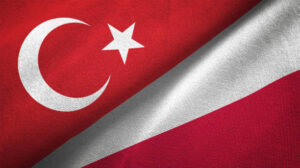
According to the results of the first half of 2025, Poland remains Ukraine’s main trading partner in terms of export volumes. According to research by Active Group and Experts Club, exports to Poland amounted to US$2.45 billion.
Turkey ranks second with USD 1.71 billion, and Italy ranks third with USD 1.17 billion. Other major partners include: Germany ($1.09 billion), Spain ($976 million), the Netherlands ($919 million), China ($847 million), Egypt ($776 million), Romania ($679 million), and Hungary ($652 million).
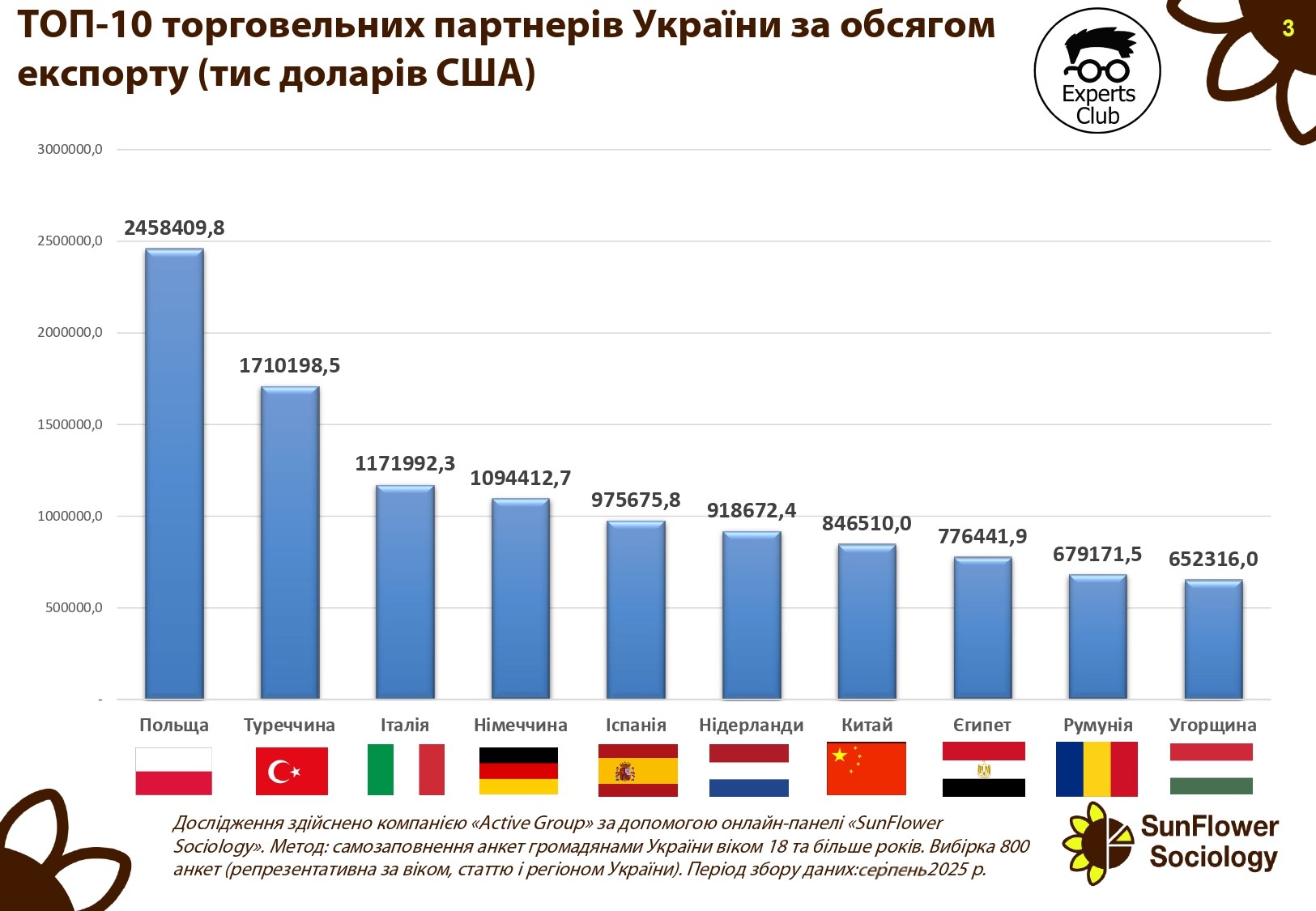
“The structure of Ukraine’s exports shows a clear focus on European Union countries. Poland, Italy, Germany, Spain, and the Netherlands together account for more than half of total exports. This indicates Ukraine’s strategic integration into the European economic space,” emphasized Maksim Urakin, founder of Experts Club and economist.
He also noted that Turkey remains a critically important partner for Ukrainian agricultural and metallurgical exports, while China and Egypt are key markets for agricultural products, particularly grains.
“The presence of trading partners such as Egypt and China diversifies Ukrainian exports,” Urakin added.
CHINA, ECONOMY, EGYPT, EXPERTS CLUB, EXPORTS, GERMANY, HUNGARY, ITALY, POLAND, ROMANIA, TRADE, TURKEY, UKRAINE, МАКСИМ УРАКИН
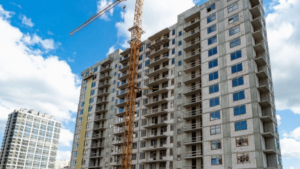
In the first half of 2025, 51,500 apartments were commissioned in Ukraine, which is 6.7% less than in the same period last year, according to the State Statistics Service. The total area of new housing was 4.27 million square meters (-6.4%).
The leaders in construction remain the Kyiv region (9,853 apartments), Kyiv (7,380), and Lviv region (5,646, +8.9%). Together, they accounted for almost half of all new construction.
The main breakthrough was in the Odesa region, where 6,570 apartments were completed, which is 56% more than a year earlier. Growth was also seen in the Cherkasy (+51.6%), Mykolaiv (+35.8%), Chernihiv (+24.4%), and Ternopil (+23.7%) regions.
At the same time, a serious decline was recorded in the Kharkiv (-40.4%), Zhytomyr (-37.7%), Zaporizhzhia (-30.6%), Sumy (-29.1%), and Volyn (-27.2%) regions. The reasons for this are proximity to the front line, population migration, and falling demand.
Experts note that the overall decline in volume does not mean a crisis: the market is becoming more multipolar. Kyiv is gradually losing its monopoly, and new construction centers are forming in Odesa and Lviv.
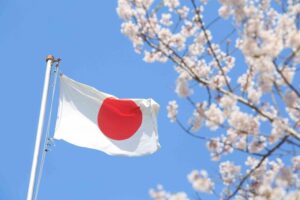
According to a survey conducted by Active Group in collaboration with Experts Club in August 2025, Ukraine has one of the most positive attitudes toward Japan among countries worldwide.
According to the study, 68.7% of Ukrainians have a positive opinion of Japan (33.0% — mostly positive, 35.7% — completely positive). Only 2.7% have a negative opinion, while 26.7% of respondents are neutral. Another 2.0% admitted that they know little about the country.
“Japan occupies a special place in the perception of Ukrainians. It is seen as an example of a country that has achieved great results through innovation, technological development, and the preservation of traditions. This level of trust can become the basis for further expansion of cooperation between our countries,” emphasized Active Group CEO Oleksandr Pozniy.
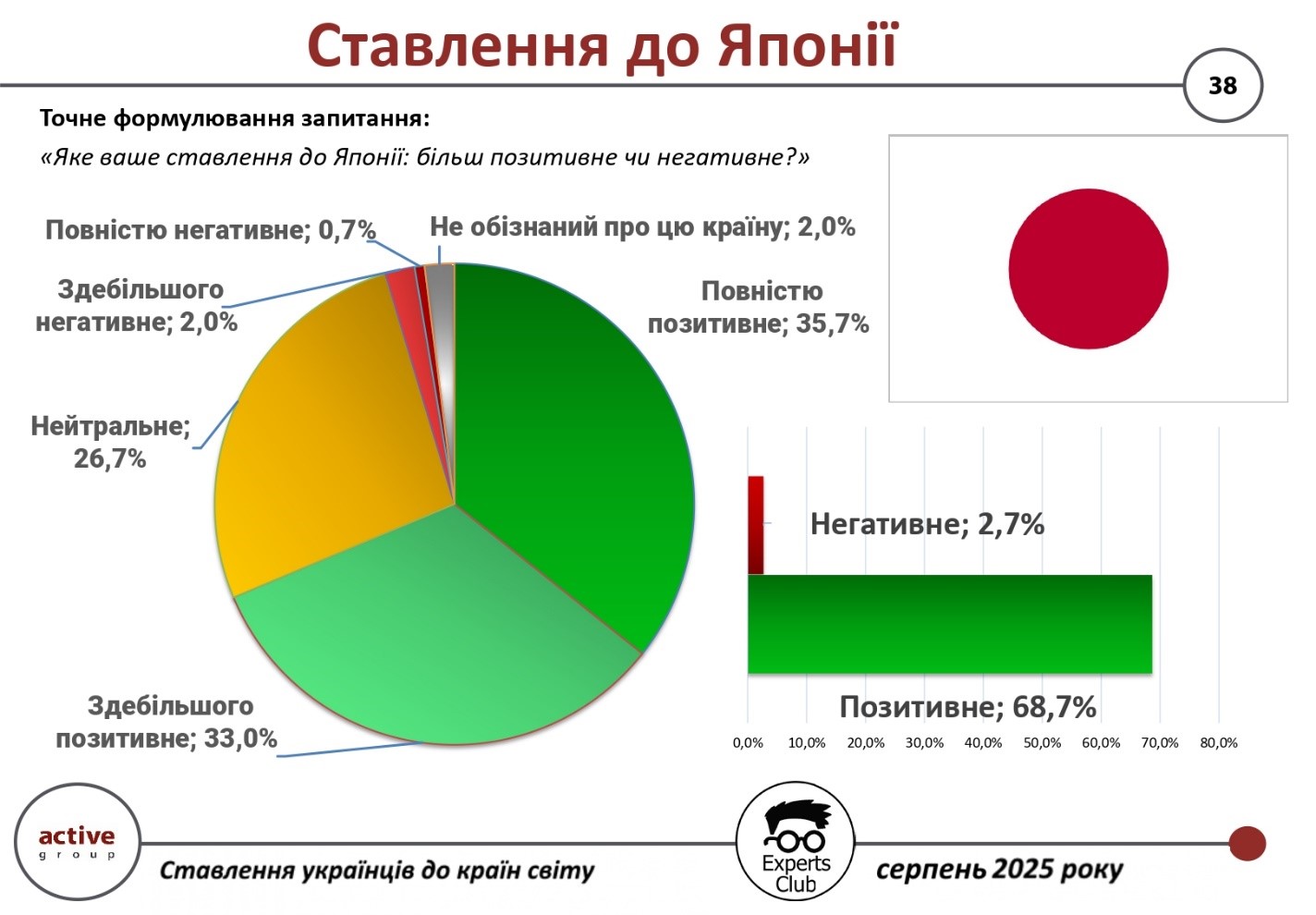
In turn, Maksim Urakin, co-founder of Experts Club, emphasized the economic dimension:
“In 2025, the total trade volume between Ukraine and Japan exceeded $521 million. At the same time, Ukrainian exports to Japan amounted to only $18 million, while imports exceeded $502 million.
This resulted in a significant negative balance of $484 million. Such an imbalance is a signal to look for new opportunities for Ukrainian goods to enter the Japanese market,” he stressed.
The study was part of regular monthly monitoring of Ukrainians’ attitudes toward key international partners.
The full video can be viewed at: https://www.youtube.com/watch?v=YgC9TPnMoMI&t
You can subscribe to the Experts Club YouTube channel here: https://www.youtube.com/@ExpertsClub
ACTIVE GROUP, EXPERTS CLUB, JAPAN, Pozniy, RELATIONS, SOCIOLOGY, TRADE, UKRAINE, URAKIN

Ukraine has the potential to expand bilateral agricultural trade with the US, particularly in the export of meat, eggs, corn, and queen bees, according to the State Service for Food Safety and Consumer Protection following a working visit to the US by the agency’s head, Serhiy Tkachuk.
The State Service noted that during the visit, Tkachuk held meetings with representatives of three departments of the US Department of Agriculture.
Together with the USDA Foreign Agricultural Service (FAS), the parties discussed increasing bilateral trade in agricultural products. Ukraine has the potential to replace Russian and Chinese products on the American market, the agency assured. Particular attention was paid to opening the US market for Ukrainian poultry and eggs.
Negotiations with the USDA Food Safety Inspection Service (FSIS) focused on access to the US market for Ukrainian poultry meat and eggs. The State Service of Ukraine for Food Safety and Consumer Protection has already provided all the necessary information and expressed its readiness to undergo inspections, including online. This practice has been successfully applied in cooperation with the United Kingdom, Canada, and the EU.
The Ukrainian side emphasized the importance of moving forward with applications for the export of pork and beef, and the FSIS confirmed its readiness to begin technical consultations.
The meeting with the USDA Animal and Plant Health Inspection Service (APHIS) was devoted to the epizootic situation, the procedure for assessing the status of diseases, and inspections.
In addition, the meetings discussed the prospects for exporting Ukrainian corn and queen bees. The American side positively assessed the dynamics regarding corn and promised to consider the issue of bees in the near future.
“These dialogues confirm that even in times of war, the Ukrainian agricultural sector remains a reliable and promising partner. We feel the support of our American colleagues and their willingness to move forward in opening up new opportunities for Ukraine,” concluded the head of the State Food and Consumer Service.
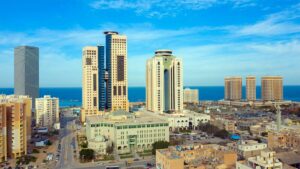
Ukrainians have a predominantly neutral attitude towards Libya, although the level of negative assessments is higher than for most other North African countries. This is evidenced by the results of a survey conducted by Active Group in partnership with Experts Club.
According to the data, 9.3% of respondents expressed a positive attitude toward Libya (6% — mostly positive, 3.3% — completely positive). A negative attitude was expressed by 14.3% of respondents (11.7% — mostly negative, 2.7% — completely negative). The majority of Ukrainians — 69.7% — took a neutral position, while another 6.7% said they did not have enough information.
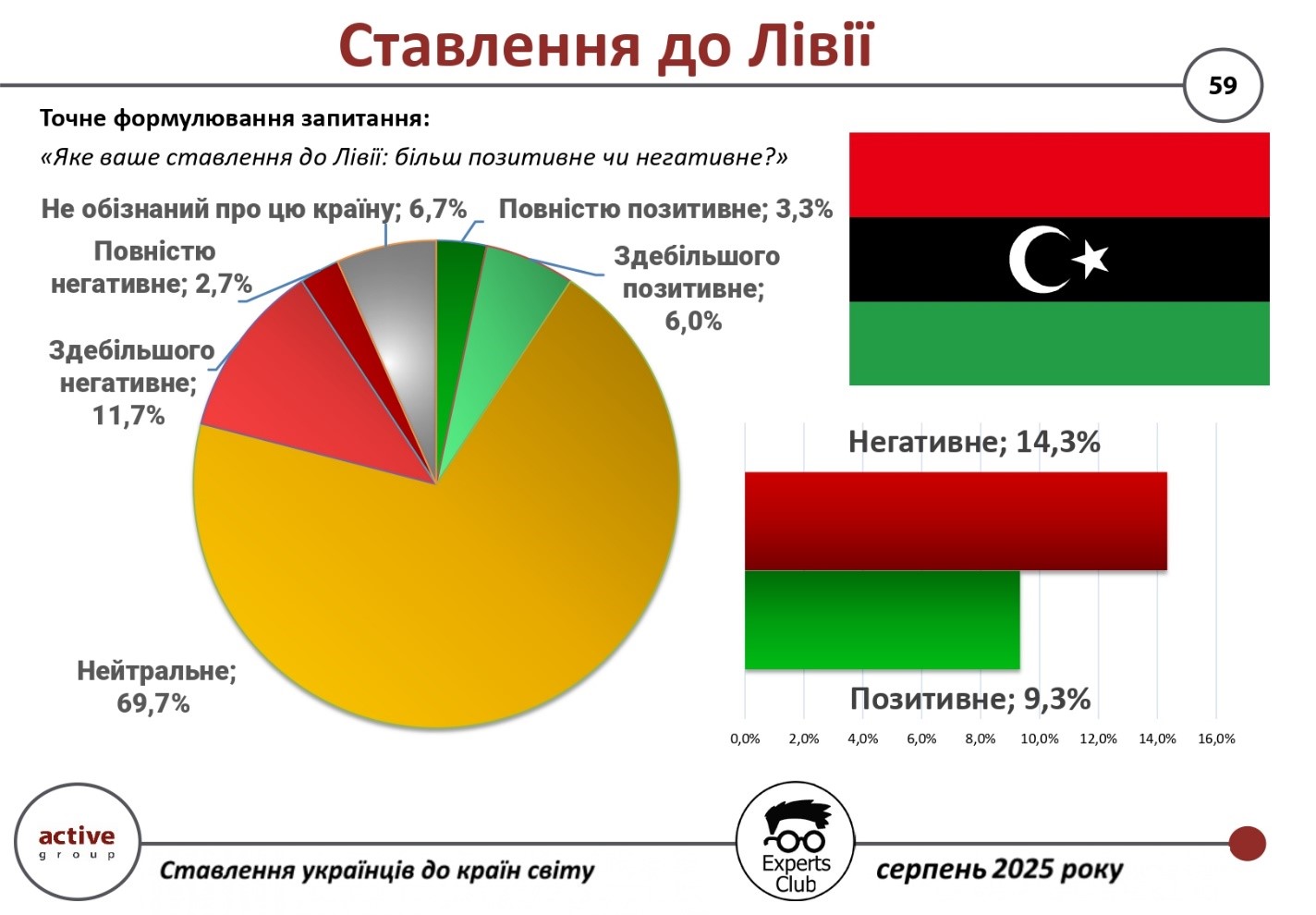
In 2024, trade turnover between Ukraine and Libya amounted to $149.7 million, of which exports accounted for $141.7 million and imports for $8.1 million. The positive balance was $133.6 million.
“Libya remains a traditional market for Ukrainian agricultural products, but political instability in that country affects both trade dynamics and perceptions among Ukrainians. The high level of neutrality indicates a lack of knowledge, as well as the absence of stable humanitarian and cultural ties,” commented economist and founder of Experts Club Maksim Urakin.
The full video can be viewed at: https://www.youtube.com/watch?v=YgC9TPnMoMI&t
You can subscribe to the Experts Club YouTube channel here: https://www.youtube.com/@ExpertsClub
ACTIVE GROUP, EXPERTS CLUB, Livia, Pozniy, SOCIOLOGY, TRADE, UKRAINE, URAKIN

Ukrainians are generally neutral towards Tunisia, according to the results of a study conducted by Active Group in collaboration with Experts Club.
According to the survey, 16% of respondents have a positive opinion of the country (12.3% – mostly positive, 3.7% – completely positive). Four percent of respondents expressed a negative opinion (2.3% – mostly negative, 1.7% – completely negative). At the same time, the majority of Ukrainians chose a neutral position – 72.3%, while another 7.7% said they knew little about this country.
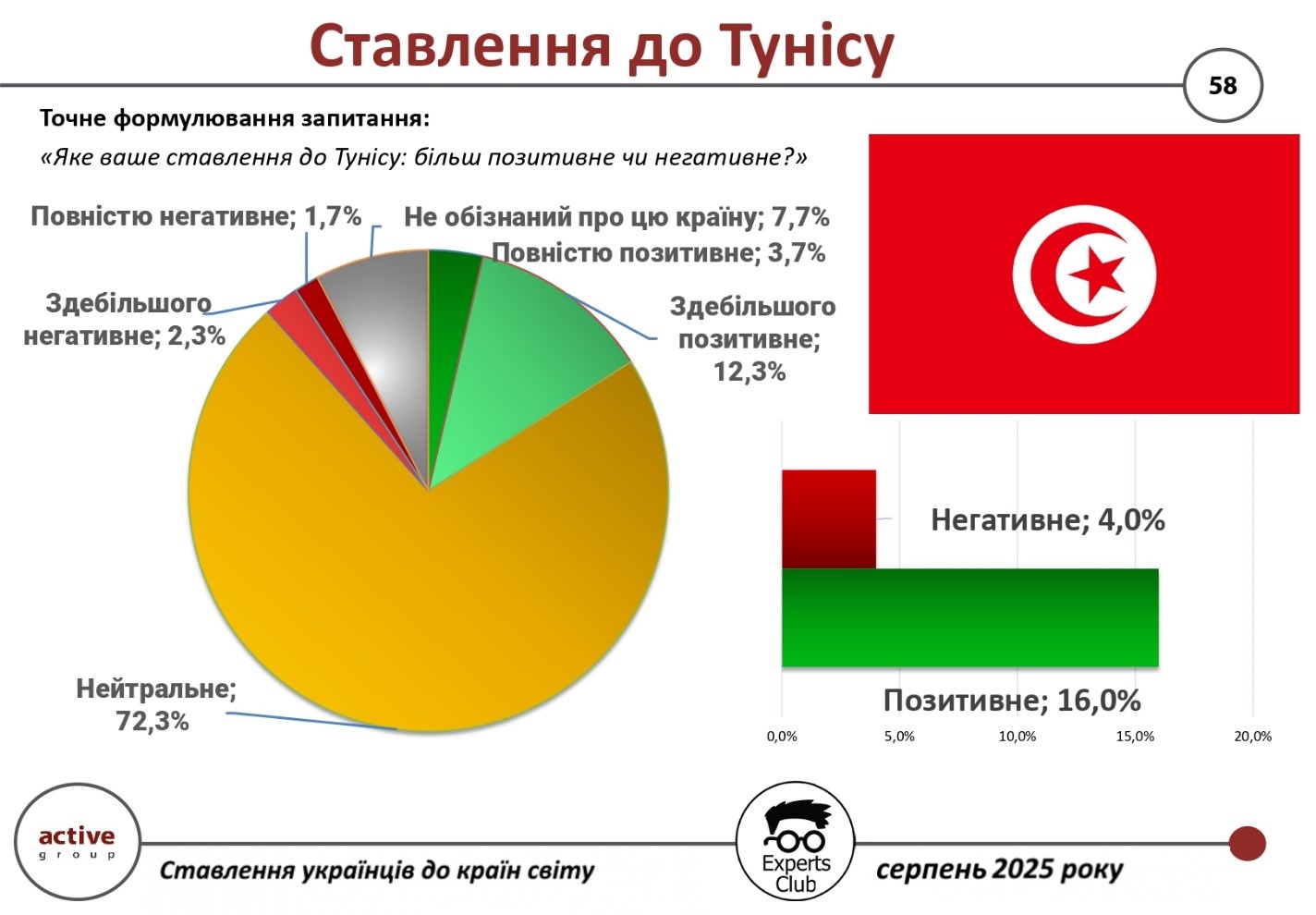
At the end of 2024, trade turnover between Ukraine and Tunisia amounted to $153.9 million, of which Ukrainian exports amounted to $133.4 million and imports to $20.5 million. The positive balance was $112.9 million.
“Ukraine has fairly stable economic relations with Tunisia. The significant positive trade balance shows that Ukrainian goods, in particular agricultural products and metals, are in demand in the North African market. At the same time, due to geographical distance and weak information links, Ukrainians’ attitude towards Tunisia is mostly neutral,” said Experts Club founder Maksim Urakin.
The full video can be viewed at: https://www.youtube.com/watch?v=YgC9TPnMoMI&t
You can subscribe to the Experts Club YouTube channel here: https://www.youtube.com/@ExpertsClub
ACTIVE GROUP, EXPERTS CLUB, Pozniy, SOCIOLOGY, TRADE, TUNISIA, UKRAINE, URAKIN